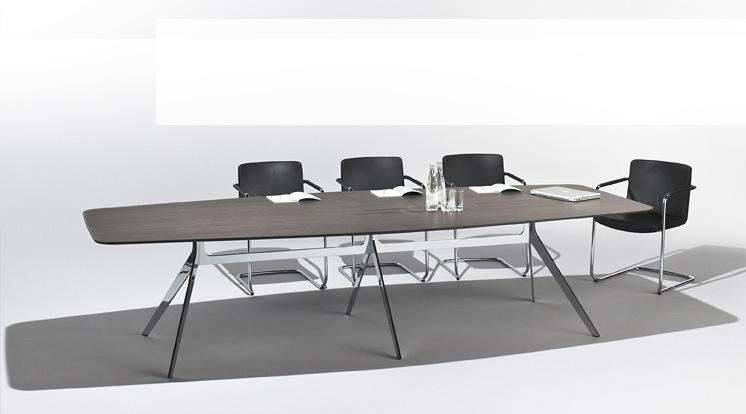(单词翻译:单击)
听力文本
Hello and welcome to Words and Their Stories from VOA Learning English!
On this program, we explore the stories behind common expressions in American English.
Today, we talk about an object found in every home. We eat off them. We can also work at them. We play games on them and, at other times, we simply gather around them.
They are tables!
A table is often at the center of many activities. So it is not surprising that the word "table" is used in several common expressions.
Let's start with a very simple one: to table something.

George Bernard Shaw was a famous playwright. He reportedly said that "England and America are separated by the same language."
However, he may not have said that. It was the Irish writer Oscar Wilde who wrote years earlier in his 1887 story The Canterville Ghost, "... we have really everything in common with America nowadays, except, of course, language."
Regardless of who said it first, there is truth in this funny statement. Similar expressions can sometimes mean different things in the U.K and the U.S.
For example, the term to table means one thing in Britain, while it means the exact opposite in the United States.
When Britain's parliament wishes to consider an issue for discussion, members vote "to table it." On the other hand, when the United States Senate or House of Representatives votes "to table" a proposal, lawmakers decide to set aside the plan or even kill it altogether.
These differences led to misunderstandings between the two countries shortly after the United States entered World War II.
As the Americans and British began to develop joint military plans, the term "to table" usually required a clearer explanation. There were British proposals that the Americans were strongly opposed to. They did not even want to discuss them. Respectfully, they said, "Let's table them."
The British were happy to hear that. They thought the Americans were ready to give the proposals serious considerations. Boy, were they wrong!
For a time, the misunderstandings could be troublesome. But in time, the two sides grew to understand what each meant by the expression "to table." And communications between them improved.
So did their military situation. In time, the Allies turned the tables on Nazi Germany. After being on the defensive for a long time, allied forces moved forward to take the offensive on all battle fronts.
The Allies turned the tables on German forces and defeated them.
The expression "to turn the tables" means to give opponents the same treatment they have been giving you. This saying comes from a popular 16th century card game.
In the game, a player might have found themselves in a worse position than his opponent. And so, turning the board, or table, around put the other person in the same position.
Now, let us hear this expression used in an everyday conversation.
A: Hey did you watch your boss's television interview about education reform?
B: Not yet. I hate watching her speak to reporters. Most of them are unfair and unprepared.
A: Well, your boss was ready for them. She turned the tables on all of them. She brought all her facts and knowledge about the issue to the table. She supplied hard evidence that proved their accusations wrong.
B: In that case, I'll watch that interview right away! Nothing is better than seeing the tables turn against unfair reporters.
So the expression "turn the tables" comes from a game and so does the expression cards on the table.
If we put our cards on the table we lay everything out in plain view. Nothing is hidden. However, people who want to keep their plans secret, deal under the table. This expression is used to describe dishonest activities, such as cheating.
An employer who pays a worker under the table is paying them illegally without taking out taxes.
But if you bring something to a party, you don't put it under the table. You put it on the table. Often when people are invited to parties, they bring something to eat or drink to share. Whether it is a bottle of wine or a chocolate cake, these gifts go on a table for everyone to enjoy.
In American English, however, what you bring to the table is not limited to food or something to drink.
What you bring to the table can be interesting stories, personal knowledge of a subject or a witty sense of humor. These things all make the event better. So, people who bring something to the table are those who bring something of value to a party, a meeting or event.
On the other hand, if someone does not bring anything of value to a gathering, for whatever reason, we can say that person brings nothing to the table.
You might ask, what does VOA Learning English bring to the table? We create stories and programs every day that hopefully help you improve your English.
重点解析
1.have sth in common 有共同之处;有共同点
We have everything in common and dated happily for a year and a half.
我们有很多共同语言,幸福地相恋一年半了。
2.United States Senate 美国参议院
fter extensive debate, the United States Senate last week passed a comprehensive immigration bill.
经过广泛争论,美国参议院于上周通过了一项综合移民法案。
3.House of Representatives 众议院
The House of Representatives approved a new budget plan.
众议院批准了一项最新预算案。
4.in that case 那样的话;那样的话;在那种情况下
In that case, this month's plan is bound to fall through.
这样一来,本月的计划就要泡汤了。
参考译文
欢迎来到VOA学英语《词汇掌故》节目。
我们的节目探索常用美语表达背后的故事。
今天,我们聊聊每个家庭里都会有的一个物体。我们在它们上面吃东西,也可以在它们上面工作。我们在它们上面玩游戏,其他时间,我们只是聚集在它们周围。
它们就是桌子!
桌子经常处在一些活动的中心位置。所以单词“桌子”运用在一些常用表达里也就不足为怪了。
让我们从一个非常简单的表达开始:to table something。
乔治·伯纳德·萧是一位非常著名的剧作家。据报道他曾说“英国和美国以同一种语言相区分。”
但是也许他并没有说过那句话。爱尔兰作家奥斯卡·王尔德多年前在他1887年的小说《坎特维尔幽灵》中写道,“现在我们真的和美国一切东西都一样,当然,除了语言。”
不论谁先说的这句话,这句玩笑话里有真理。相似的表达在英国和美国却能表达出不同的意思。
例如,短语“to table”在英国是一个意思,但在美国它表达的意思却完全相反。
当英国议会想讨论一个问题时,议员们会表决“商议(to table it)”。另一方面,当美国参议院或者众议院表决“to table(搁置)”一个提议,那立法者们决定把这个计划放一边或者甚至集体否决。
这些差异造成了两国之间在美国参与二战不久后的误会。
当美国和英国开始制定联合作战计划时,短语“to table”经常需要一个明确的释意。英国的提议遭到了美国的强烈反对,美国人甚至都不想讨论了。出于尊敬,他们说:“让我们暂时搁置一下这些问题吧。”
英国人听到这句话很高兴。他们以为美国人打算认真考虑他们的提议。伙计,他们错了!
一段时间之内,这些误解会造成麻烦。但是还好两国及时渐渐明白了各自说的“to table”的意思。双方的交流也得到了改善。
他们的战况也是。盟军适时扭转了对纳粹德国的局势。防御了很长时间后,同盟国在所有前线发起了进攻。
同盟国反转了局势,战胜了德军。
表达“扭转局面(to turn the tables)”意思是像对手对待你一样去对待他们。这个表达源自16世纪时的一个流行的纸牌游戏。
游戏中,一个玩家可能发现相较对手的位置,自己的位置有点糟糕。于是便把木板或者桌子翻转过来,让另一个人也处于相同的位置。
现在,让我们来听听这个表达在日常对话中的使用方法。
A:嘿,你看了你老板关于教育改革的电视访谈吗?
B:还没。我讨厌看她和记者说话。大多数记者既不公平又毫无准备。
A:好吧,你老板准备好对付他们了。她扭转了局面。她把所有关于教育改革问题的事实和知识都拿出来讨论。她提供了强有力的证据证明了他们的指控是错误的。
B:那样的话,我要马上看采访了!没有什么比反击那些不公正的记者更好看的了。
和表达“turn the tables”来自游戏一样,表达“cards on the table(摊牌)”也是一样。
如果我们把牌放在桌子上,我们把所有的东西都放得一览无余。没有隐藏什么。然而,那些想让计划保密的人,他们会私下交易(under the table)。这个短语用来形容欺骗性的活动,例如作弊。
雇主私下付工资给工人是说雇主用非法的方式付工资来逃税。
但如果你带一些东西去了聚会,你没有把它们放在桌下,而是放在了桌上。一般当人们被邀请去参加聚会,他们会带些吃得或者喝的去分享给大家。不论是一瓶酒或者一块巧克力蛋糕,这些礼物放在桌上,每个人都能品尝。
然而在美语里,你带来放桌子上的东西不局限于食物或者一些喝的东西。
你可以有一些有趣的故事,关于某个主题的知识或者一种诙谐的幽默感。这些会使活动更热闹。所以,那些带东西参加聚会的人是指那些带对聚会,会议或者活动有意义的东西的人。
另一方面,如果有人不带任何有意义的东西来参加聚会,无论出于什么原因,我们可以说这个人什么也不带。
你也许会问,VOA学英语带了什么东西?我们每天创建故事和节目,期待能帮助你提高英语水平。
感谢收听。我是安娜·马特奥。


